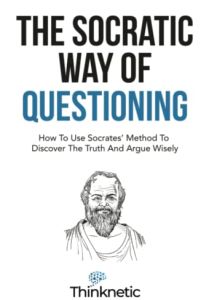Melden Sie sich bei getAbstract an, um die Zusammenfassung zu erhalten.

Melden Sie sich bei getAbstract an, um die Zusammenfassung zu erhalten.
Michael Britton
The Socratic Way of Questioning
How to Use Socrates’ Method to Discover the Truth and Argue Wisely
Thinknetic, 2021
Was ist drin?
Let Socrates help you dissect problems skillfully and react rationally.
Recommendation
The art of Socratic questioning, an ancient method of critical thinking, has renewed relevance in the age of disinformation and fake news. A foundation for scientific methods of research and applied logic, Socrates’s model for exploring the world and the meaning of existence is also a philosophical cornerstone. Writer Michael Britton explains how Socratic questioning can help you sharpen your mind, recognize your biases, instigate dialogues that reveal true questions, and make informed decisions. With an unrelenting commitment to truth and rationality, his book challenges readers to think.
Summary
About the Author
Michael Britton is a freelance writer and author of several books.




















Comment on this summary